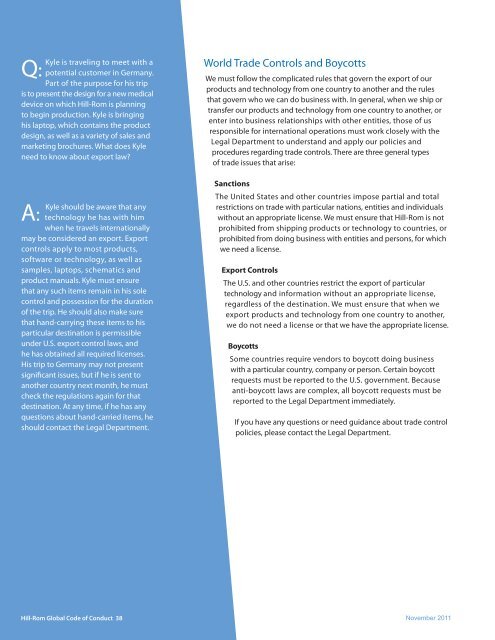Hill-Rom Global Code of Conduct
Hill-Rom Global Code of Conduct
Hill-Rom Global Code of Conduct
Create successful ePaper yourself
Turn your PDF publications into a flip-book with our unique Google optimized e-Paper software.
Q:<br />
Kyle is traveling to meet with a<br />
potential customer in Germany.<br />
Part <strong>of</strong> the purpose for his trip<br />
is to present the design for a new medical<br />
device on which <strong>Hill</strong>-<strong>Rom</strong> is planning<br />
to begin production. Kyle is bringing<br />
his laptop, which contains the product<br />
design, as well as a variety <strong>of</strong> sales and<br />
marketing brochures. What does Kyle<br />
need to know about export law?<br />
A:<br />
Kyle should be aware that any<br />
technology he has with him<br />
when he travels internationally<br />
may be considered an export. Export<br />
controls apply to most products,<br />
s<strong>of</strong>tware or technology, as well as<br />
samples, laptops, schematics and<br />
product manuals. Kyle must ensure<br />
that any such items remain in his sole<br />
control and possession for the duration<br />
<strong>of</strong> the trip. He should also make sure<br />
that hand-carrying these items to his<br />
particular destination is permissible<br />
under U.S. export control laws, and<br />
he has obtained all required licenses.<br />
His trip to Germany may not present<br />
significant issues, but if he is sent to<br />
another country next month, he must<br />
check the regulations again for that<br />
destination. At any time, if he has any<br />
questions about hand-carried items, he<br />
should contact the Legal Department.<br />
<strong>Hill</strong>-<strong>Rom</strong> <strong>Global</strong> <strong>Code</strong> <strong>of</strong> <strong>Conduct</strong> 38<br />
World Trade Controls and Boycotts<br />
We must follow the complicated rules that govern the export <strong>of</strong> our<br />
products and technology from one country to another and the rules<br />
that govern who we can do business with. In general, when we ship or<br />
transfer our products and technology from one country to another, or<br />
enter into business relationships with other entities, those <strong>of</strong> us<br />
responsible for international operations must work closely with the<br />
Legal Department to understand and apply our policies and<br />
procedures regarding trade controls. There are three general types<br />
<strong>of</strong> trade issues that arise:<br />
Sanctions<br />
The United States and other countries impose partial and total<br />
restrictions on trade with particular nations, entities and individuals<br />
without an appropriate license. We must ensure that <strong>Hill</strong>-<strong>Rom</strong> is not<br />
prohibited from shipping products or technology to countries, or<br />
prohibited from doing business with entities and persons, for which<br />
we need a license.<br />
Export Controls<br />
The U.S. and other countries restrict the export <strong>of</strong> particular<br />
technology and information without an appropriate license,<br />
regardless <strong>of</strong> the destination. We must ensure that when we<br />
export products and technology from one country to another,<br />
we do not need a license or that we have the appropriate license.<br />
Boycotts<br />
Some countries require vendors to boycott doing business<br />
with a particular country, company or person. Certain boycott<br />
requests must be reported to the U.S. government. Because<br />
anti-boycott laws are complex, all boycott requests must be<br />
reported to the Legal Department immediately.<br />
If you have any questions or need guidance about trade control<br />
policies, please contact the Legal Department.<br />
November 2011<br />
Complying with Worldwide Competition Laws<br />
We achieve results based on the quality <strong>of</strong> our products and our<br />
employees, never through unfair business practices. We must abide<br />
by all competition laws (sometimes referred to as “antitrust” laws)<br />
that apply to our work. These laws may vary from market to market,<br />
but their goal is the same. They are designed to preserve free and<br />
open competition and promote a competitive marketplace. Failure<br />
to comply with these laws can have serious and far-reaching<br />
consequences for our company and the individuals involved.<br />
Sharing Information<br />
We must not share commercial or market information with our<br />
competitors concerning pricing, conditions and terms <strong>of</strong> sale,<br />
costs, markets or customers.<br />
Collusion with Competitors<br />
We must not discuss or agree with competitors to set prices, allocate<br />
markets or tenders, discriminate against customers or suppliers or<br />
coordinate activity in any other way.<br />
Restricting Customers and Suppliers<br />
We must consult with and obtain approval from the Legal Department<br />
when we are considering entering into an agreement with<br />
a customer that would prohibit a customer from purchasing<br />
products from our competitors. Similarly, we also must consult<br />
with and obtain approval from the Legal Department when we are<br />
considering entering into an agreement with a supplier that could<br />
place restrictions on supplying one <strong>of</strong> our competitors.<br />
For additional guidance, please refer to our Antitrust Policy,<br />
which is located on our intranet, or the Legal Department. Should<br />
any competitor, customer or supplier begin to discuss any issues<br />
that raise antitrust concerns with you, please contact the Legal<br />
Department immediately.<br />
RULES FOR DEALING WITH COMPETITORS<br />
ALWAYS:<br />
• Refuse to take part in discussions or arrangements<br />
that may be seen as anti-competitive;<br />
• Communicate any actual or potential anti-<br />
competitive discussions you have witnessed<br />
or taken part in to the Legal Department or<br />
the Compliance Office;<br />
• Seek advice from the Legal Department if<br />
you come across confidential or proprietary<br />
information about <strong>Hill</strong>-<strong>Rom</strong>’s competitors.<br />
NEVER:<br />
Q:<br />
A:<br />
• Share confidential information with competitors<br />
— including bids, proposals or strategies;<br />
• Discuss pricing, whether formally or informally,<br />
with competitors;<br />
• Agree, whether formally or informally,<br />
to allocate markets or territories.<br />
Carla has a good friend who<br />
works for one <strong>of</strong> <strong>Hill</strong>-<strong>Rom</strong>’s<br />
competitors. The two meet<br />
for lunch, and Carla reveals that<br />
<strong>Hill</strong>-<strong>Rom</strong> plans to submit a bid for<br />
capital equipment to a local hospital.<br />
Her friend indicates that he is<br />
struggling in his own job and asks<br />
if she would consider not entering<br />
the bid, allowing his company a better<br />
chance at securing the business<br />
instead. Carla wants to help her<br />
friend, but knows that what he’s<br />
asking <strong>of</strong> her isn’t right. What should<br />
Carla do?<br />
Carla should refuse to speak<br />
about this subject with her<br />
friend and should relay the<br />
conversation to the Legal Department<br />
or the Compliance Office immediately.<br />
We must never discuss dividing<br />
clients, contractors or vendors with<br />
a competitor. It is illegal to make any<br />
agreement, even an informal oral<br />
agreement, with a competitor that<br />
restricts competition. In addition,<br />
we must never share confidential<br />
information with our competitors.<br />
This includes bids, proposals or<br />
strategies. When making her report,<br />
Carla should be sure to mention her<br />
disclosure <strong>of</strong> <strong>Hill</strong>-<strong>Rom</strong>’s plans to submit<br />
the bid for capital equipment, so that<br />
<strong>Hill</strong>-<strong>Rom</strong> can take appropriate action.<br />
<strong>Hill</strong>-<strong>Rom</strong> <strong>Global</strong> <strong>Code</strong> <strong>of</strong> <strong>Conduct</strong> 39
















